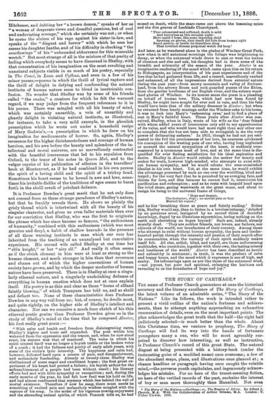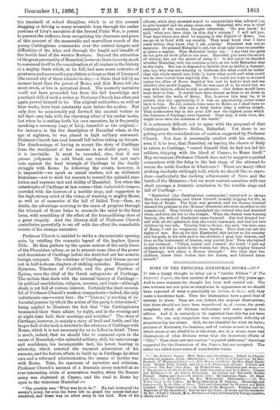THE STORY OF CARTHAGE.*
THE name of Professor Church guarantees at once the historical- accuracy and the literary excellence of The Story of Carthage, the latest volume of an admirable series, "The Story of the Nations." Like its fellows, the work is intended rather to- present a vivid outline of the nation's fortunes and achieve- ments, than to attempt anything approaching an exhaustive enumeration of details, even on the most important points. The- plan acknowledges the great truth that the half—the right half judiciously selected—is mach better than the whole. About this Christmas time, we venture to prophesy, The Story of Carthage will find its way into the hands of fortunate- youngsters many a one, who will be most agreeably sur- prised to discover how interesting, as well as instructive,. is Professor Church's record of this great State. The natural disgust at being presented with a history-book (under the- insinuating guise of a modified name) once overcome; a few of the abundant maps, plans, and illustrations once glanced at ; a. chance headline or paragraph having once caught the volatile mind,—the perverse youth capitulates, and ingenuously acknow- ledges his mistake. For no hero of the truest-seeming fiction, no hero of the verified records of the past, enchains the interest of boy or man more thoroughly than Hannibal. Not even • The Story of the Rations.—Carthage; or, The Empire of Africa. By Alfred J. Church, IL A. With the Collaboration of Arthur Gilman, M.A. London : T. Fisher Hnwin. 1886.
the treadmill of school discipline, which is at this present dragging or driving so many miserable boys through the earlier portions of Livy's narrative of the Second Panic War, is potent to prevent the sufferers from recognising the clearness and grace of this account of the memorable and marvellous march of the young Carthaginian commander over the untried dangers and difficulties of the Alps, and through the length and breadth of the hostile land of the warrior Romans. Beyond the attraction of the great personality of Hannibal, however, there is surely much to commend itself to the consideration of all readers in the history -of a mighty State which, at its fall, had seen seven centuries of greatness, and possessed a population as large as that of Liverpool (the second city of these islands) to-day,—a State that fell by no meaner hand than the power of Rome, and that Rome felt she must crush, or live in perpetual dread. The masterly narrative could not have proceeded but from the full knowledge and practised skill of such a writer as Professor Church has often and again proved himself to be. The original authorities, as well as -later works, have been constantly open before the author. Not only does he occasionally put forward the ancient writers to tell their own tale, with the charming effect of his earlier books, but when he is setting forth his own narrative, he is frequently -speaking a summary (say) of Livy, beautiful as the original,— 'for instance, in the fine description of Hannibal when, at the age of eighteen, he was placed in high military command. Professor Church has read himself full before taking up his pen. The disadvantage of having to accept the story of Carthage from the standpoint of her enemies is no doubt great ; but it is inevitable. It must be conceded, also, that if one passes judgment in cold blood, one cannot but cast one's vote against the final triumph of Carthage in the deadly struggle with Rome. In following the events, however, it is impossible—we speak as casual readers, not as deliberate historians—not to wish for success to reward the splendid reso- lution and supreme tact and ability of Hannibal. Yet when the -catastrophe of Carthage at last comes—that ineluetabile tempus, -crowded with the horrors of a terrible siege, and suggestive to the high-strung mind of the victor, of warning to mighty Rome, as well as of memories of the fall of fabled Troy—then, no -doubt, the advantage accruing to the cause of progress through the triumph of Rome helps to reconcile the mind to the fatal issue, with something of the effect of the tranquillising close of a great tragedy. And the literary skill of Professor Church contributes powerfully to set off with due effect the remarkable -events of his strange narrative.
Professor Church is enabled to strike a characteristic opening note, by retelling the romantic legend of the hapless Queen Dido. He then gathers up the sparse notices of the early times of the Phcenician colony, so as to present some idea of the power and dominions of Carthage before she stretched out her arms to foreign conquest. The relations of Carthage and Greece are set out in half-a-dozen chapters of striking episodes. Dionysius of Syracuse, Timoleon of Corinth, and the great Pyrrhus of Epirus, were the chief of the Greek antagonists of Carthage. The section that deals with the internal history of Carthage— its political constitution, religion, revenue, and trade—although short, is yet full of curious interest. Certainly the least success- ful of Professor Church's modern comparisons—indeed, the only unfortunate one—occurs here : the "'Caucus,' a meeting of in- fluential persons by which the action of the party is determined," being applied to illustrate the fact that "the Carthaginians transacted their State affairs by night, and in the evening and at night-time held their meetings and societies." The story of -Carthage, however, is mainly a story of broil and battle, and the larger half of the book is devoted to the relations of Carthage with Rome, which it is not necessary for us to follow in detail. There is much, indeed, that we should like to comment upon in the career of Hannibal,—his splendid military skill, his rare courage and confidence, his incomparable tact, his heroic bearing in adversity, which extorted the warmest admiration of his enemies, and his forlorn efforts to build up in Carthage, by strict -care and a reformed administration, the means of farther war with Rome. Take, for specimen of narrative and criticism, Professor Church's account of a dramatic scene enacted at an ever-interesting crisis of momentous resolve, when the Roman army was shattered at Canine, and the road to Rome lay open to the victorious Hannibal :—
" The question was, What was he to do ?' He had destroyed the enemy's army, for even the force left to guard the camps had sur- rendered, and there was no other army in the field. Most of his officers, while they crowded round to congratulate him, advised him to give himself and his army some rest. Maharbal, who was in chief command of the cavalry, thought otherwise. Do you know,' he said, what you have done by this day's victory ? I will tell you. Four days hence you shall be sapping in the Capitol of Rome. Let me go on in front with my cavalry. They must know that I have come before they know that I am coming.' Hannibal was not so sanguine. He praised Maharbal's zeal, bat mast take time to consider so grave a matter. Then Maharbal broke out : I see that the gods do not give all their gifts to one man. Hannibal, you have the secret of victory, but not the secret of using it.' It will never be decided whether Hannibal, with his cautions policy, or the bold Maharbal was in the right. But one is disposed to believe that so skilful a General, one, too, who was not wanting in boldness (for what could be bolder than this whole march into Italy P), knew what could and what could not be done better than anybody else. Ile could not hope to succeed unless the allies of Rome deserted her, and he had to wait and see whether this would happen. Till he was sure of it, he could not, we may well believe, afford to risk an advance. One defeat would have been fatal to him. It would have been almost as fatal to sit down in vain before the walls of Rome. But, however this may be, it is certain that the opportunity, if it was an opportunity, never Game back to him. He did, indeed, come near to Rome, as I shall have to tell hereafter ; but this was a feint rather than a serious attack. That midsummer day in the year 216 saw the highest point which the fortunes of Carthage ever reached. Then only, if even then, she might have been the mistress of the world."
It is extremely difficult not to agree with the proposal of that Carthaginian Redvers Buller, Maharbal. Yet there is no getting over the considerations of caution suggested by Professor Church. Nor does it necessarily conflict with his criticism, even if it be true, that Hannibal, on leaving the shores of Italy to return to Carthage, "cursed himself that he had not led his soldiers, dripping with the blood of Carom, to Rome itself." May we venture (Professor Church does not) to suggest a partial comparison with the delay in the last stage of the attempt to rescue the noble Gordon at Khartoum ? There are many other striking incidents strikingly told, which we should like to repro- duce—particularly the dashing achievement of Nero and the battle of the Metanrus—but we must content ourselves with one short passage, a dramatic conclusion to the terrible siege and fall of Carthage :— " Hasdrubal [the Carthaginian commander] contrived to escape from his companions, and threw himself, humbly begging for life, at the feet of Scipio. The boon was granted, and the Roman General
showed his prisoner to the [Roman] deserters, who were crowded on the temple-roof. They bitterly reproached the coward who had deserted them, and then set fire to the temple. When the flames were burning fiercely, the wife of Hasdrubal came forward. She had dressed her- self with all the splendour that she could command, and had her two children by her side. Turning first to Scipio, she said, 'On thee, man of Rome, I call no vengeance from heaven. Thou dost but use the rights of war. But as for this Hasdrabal, this traitor to his country and his gods, to his wife and to his children, I pray that heaven, and thou as the instrument of heaven, may punish him.' Then she turned to her husband. Villain, traitor, and coward,' she cried, '1 and my children will find a tomb in the flames, but thou, the mighty General of Carthage, wilt adorn a Roman triumph !' She then slew her children, threw their bodies into the flames, and followed them herself."

















































 Previous page
Previous page